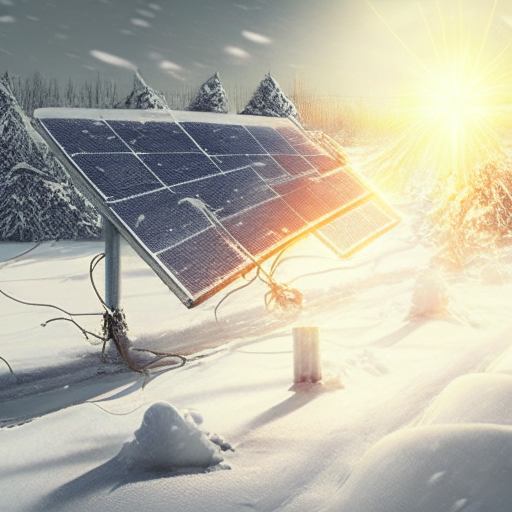Putting the Power of Solar Energy to Work in Extremely Cold Conditions
You know the value of being self-sufficient, especially in trying times, because you’re a survivalist. When it comes to utilizing renewable energy solutions that are efficient in cold places, one of the most major issues you meet is. Even if the icy air is a formidable enemy, you shouldn’t let yourself be scared of it. The untapped potential of solar power solutions in colder regions is going to be covered in this piece. By facing the challenge head-on, we will discover the secrets to harnessing solar electricity, even in the dead of winter.

A common misconception is that solar power can only be applied in regions with abundant sunshine and mild temperatures. However, advancements in technology have opened the door to solar energy harvesting in colder climates as well. Now that we’ve covered how solar power solutions work in cold climates, let’s dive into how you may take advantage of this sustainable and eco-friendly energy source.
Before anything else, you must fully grasp that solar panels do not generate heat, but rather energy from the sun’s rays. Although it’s conceivable that solar panels’ output will be affected by cooler temperatures, it doesn’t imply they are useless in the winter. You can make your solar power system work as hard as possible, no matter how cold it is, if you put some thought into it beforehand and apply some inventive solutions.
A significant aspect when using solar power in cold climates is the angle and orientation of the panels. By positioning your solar panels at the right angle, you can maximize the amount of sunlight they receive all day long. Since the sun’s rays are lower in the sky during winter, you can increase their efficacy by adjusting the angle of your panels to soak up as much light as possible. The panels will catch sunlight more effectively while facing south, which is very helpful in the winter.
Another potential issue in colder regions is snow accumulation. A heavy layer of snow can significantly reduce the efficiency of your solar panels. Having confidence in your abilities will help you overcome this obstacle. An easy alternative to consider is attaching heating elements or snow barriers to your solar panels. Your solar panels will keep producing power even while it’s snowing since these adjustments stop snow from accumulating or vanishing. Otherwise, clearing snow off your panels by hand on a frequent basis is another great way to keep them clear.
One further state-of-the-art way to make solar electricity work better in colder climates is to use battery storage devices. You can use batteries to store the energy you generate throughout the day and use them later when the sun doesn’t shine as brightly or when the temperature drops. Battery storage becomes even more crucial in extremely cold weather because it ensures a constant flow of power regardless of the sunshine availability. Maintaining your energy independence and being prepared for everything is possible with a reliable battery system, which you can acquire with an investment.
Choosing the right solar panels is crucial for cold climates if you want your solar power system to be as efficient as possible. Thanks to their design for use in colder climates, some panels may actually work better when the temperature drops. These panels could have special insulation or use high-tech materials that make them resistant to ice and frost. If you go into it with conviction, you may maximize the amount of energy you generate by choosing the panels that are best suited to your cold climate.
It is critical to choose professionals with experience installing solar power systems in cold climates to install your system. Along with the technical factors, this must also be taken into account. When it comes to installation, maintenance, and troubleshooting, they know what works best and can offer valuable advice and insights. Your solar power system can continue to operate at peak efficiency, even in subzero temperatures, thanks to their expertise.
Finally, when you adopt a survivalist mindset, it’s wise to constantly be ready and have a backup plan. Although solar power can be a reliable and effective energy source in colder climates, it is crucial to have backup generators or other energy sources as a safety net. In the case that you encounter extended periods of insufficient sunshine or unforeseen system failures, this provision can act as a safety net for you. Incorporating solar electricity into an overall renewable energy strategy can increase your energy autonomy and resilience. This remains valid irrespective of the severity of the weather.
The utilization of solar energy is not limited to regions with warm and sunny climates. Solutions that harness solar power can thrive in the harshest climates, with the right preparation and cutting-edge technology. Even in subzero temperatures, solar panels can be angled differently, snow can be avoided, battery storage systems can be integrated, environmentally friendly panel selection is key, professional installation is essential, and contingency plans should be in place. Being confident and resourceful will allow you to accept renewable energy while protecting your survival in any situation.
The post Unleashing the Power of Solar Energy in Extreme Cold appeared first on Survivalbite.
The post Unleashing the Power of Solar Energy in Extreme Cold appeared first on https://gqcentral.co.uk


Comments are closed